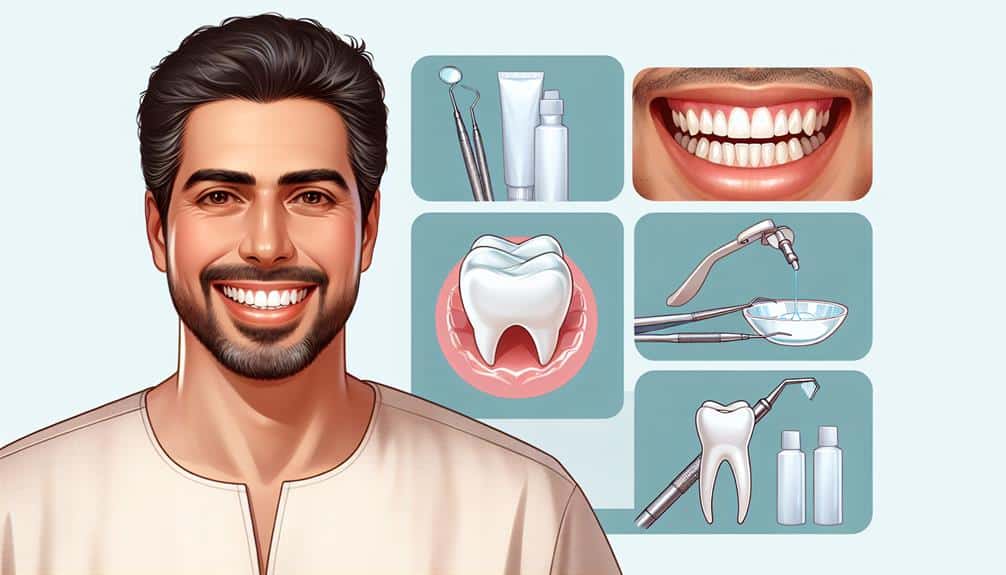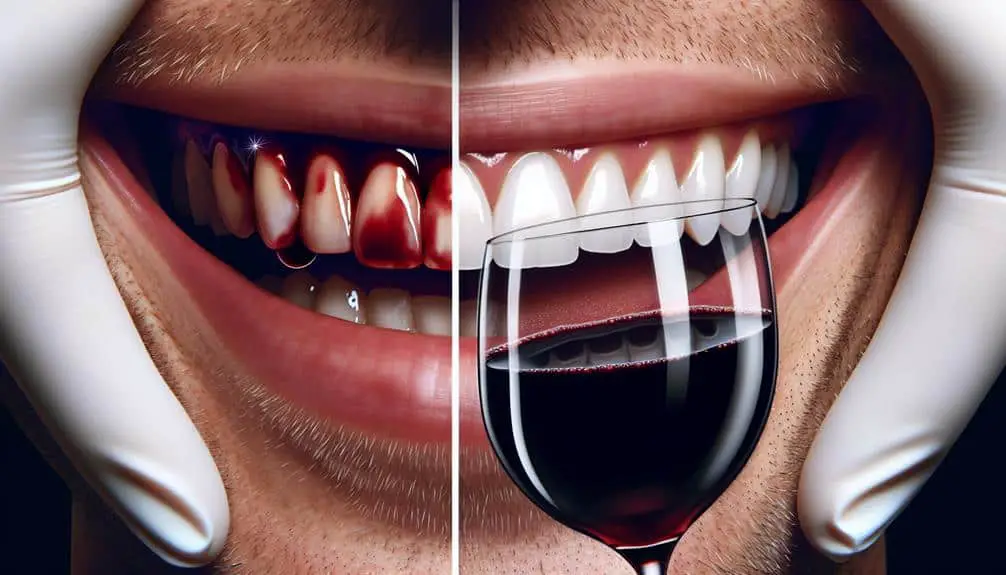Brighten your smile with lifestyle-stained teeth solutions. Cut back on staining drinks like coffee and red wine. Improve oral hygiene to prevent discoloration. Quit smoking to avoid stubborn tar stains. Aging may reveal yellow dentin, but proper care can help. Try home remedies like baking soda and lemon paste. Consider professional whitening for advanced results. Maintain whiteness by avoiding staining foods and beverages. Prioritize dental check-ups for a bright smile. Remember, caring for your teeth is key to a brighter, whiter smile.
Key Points
- Limit consumption of staining beverages like coffee, tea, and red wine.
- Practice good oral hygiene to prevent teeth discoloration.
- Consider professional whitening treatments for effective results.
- Use natural remedies like baking soda and oil pulling for whitening.
- Maintain whiter teeth by avoiding staining foods and beverages.
Causes of Lifestyle-Stained Teeth
If you frequently consume coffee, tea, or red wine, these beverages can contribute to staining your teeth over time. Along with dietary habits, poor oral hygiene practices can also play a significant role in causing lifestyle-stained teeth. Smoking is another common culprit when it comes to teeth discoloration. The tar and nicotine in cigarettes can leave stubborn stains on your teeth, impacting your smile's brightness.
Additionally, as we age, the outer layer of enamel on our teeth naturally wears down, revealing the yellowish dentin underneath, which can make our teeth appear more discolored.
To prevent or reduce lifestyle-induced teeth staining, it's important to maintain good oral hygiene practices such as regular brushing, flossing, and dental check-ups. Cutting back on teeth-staining beverages and quitting smoking can also help in preserving the whiteness of your teeth. Understanding the causes behind lifestyle-stained teeth is the first step towards achieving a brighter, more confident smile.
Home Remedies for Teeth Whitening
When seeking to brighten your smile at home, there are several effective remedies for teeth whitening that you can easily try. Utilizing DIY whitening tips can help you achieve a brighter smile while avoiding harsh chemicals found in some commercial products.
Here are some benefits of using home remedies for teeth whitening:
- Baking Soda and Lemon Juice: A mixture of baking soda and lemon juice can act as a natural whitening agent due to their abrasive and acidic properties. However, it's crucial to use this method sparingly as the acidic nature of lemon juice can erode tooth enamel with frequent use.
- Oil Pulling: This ancient technique involves swishing coconut or sesame oil around in your mouth for about 15-20 minutes. Oil pulling can help remove bacteria and stains from the teeth, leading to a brighter smile over time.
- Strawberries and Baking Soda Paste: The malic acid in strawberries combined with baking soda can help remove surface stains on teeth. This natural remedy is gentle yet effective in brightening your smile.
Professional Whitening Treatments
To enhance your smile further, consider professional whitening treatments that can provide more immediate and lasting results. Cosmetic dentistry options offer advanced solutions for teeth whitening, exceeding the effectiveness of home remedies. Dentists utilize various teeth bleaching techniques that are safe and customized to your specific needs.
Professional whitening treatments involve in-office procedures that are supervised by dental experts. One common technique is light-activated whitening, where a special light is used to enhance the bleaching process, resulting in noticeably whiter teeth in just one session. Another method includes custom trays filled with professional-grade whitening gel that you can use at home under the dentist's guidance.
These cosmetic dentistry options guarantee that your teeth are whitened effectively while ensuring the safety of your oral health. By opting for professional whitening treatments, you can achieve a radiant smile that boosts your confidence and leaves a lasting impression. Consult with your dentist to explore the best teeth whitening techniques tailored to your individual needs.
Preventing Future Stains
Implementing proper oral hygiene practices is essential for preventing future stains on your teeth. Consistent care and attention to both oral hygiene and dietary habits can greatly contribute to maintaining a bright smile.
Here are some key strategies to help you prevent future stains:
- Brushing and Flossing: Regular brushing and flossing are fundamental to oral hygiene. Brush at least twice a day and floss once daily to remove plaque and prevent staining.
- Regular Dental Check-ups: Schedule routine dental check-ups to monitor your oral health. Professional cleanings can remove surface stains before they become more pronounced.
- Mindful Dietary Choices: Be mindful of foods and drinks that can stain your teeth, such as coffee, tea, red wine, and dark berries. Limiting consumption or rinsing your mouth with water after consuming these items can help prevent staining.
Natural Ways to Maintain Whiteness
To maintain the whiteness of your teeth naturally, consider incorporating simple yet effective methods into your daily oral care routine. Start by making diet changes that promote whiter teeth. Avoid foods and beverages that are known to stain teeth, such as coffee, tea, and red wine. Instead, opt for crunchy fruits and vegetables like apples, carrots, and celery, which can help naturally scrub away surface stains. Additionally, incorporate more dairy products like cheese and yogurt into your diet, as they contain calcium and phosphates that can strengthen enamel and promote whiter teeth.
In addition to diet changes, prioritize good oral hygiene practices. Brush your teeth at least twice a day with a whitening toothpaste containing baking soda or hydrogen peroxide to help remove surface stains. Floss daily to clean between teeth and prevent plaque buildup, which can lead to yellowing. Consider rinsing with a fluoride mouthwash to strengthen enamel and further protect against stains. By combining diet adjustments with proper oral hygiene, you can naturally maintain the whiteness of your teeth and achieve a brighter smile.
Frequently Asked Questions
Are There Any Specific Foods or Drinks That Can Help Prevent Lifestyle-Stained Teeth?
To prevent lifestyle-stained teeth, consider incorporating natural remedies like crunchy fruits and vegetables. Dietary adjustments, such as reducing sugary and acidic foods, can also help. Hydration benefits your teeth by promoting saliva production to naturally cleanse and protect them.
Can Stress and Anxiety Contribute to Teeth Discoloration?
Stress and anxiety can contribute to teeth discoloration due to increased cortisol levels impacting oral health. Effective stress management techniques like meditation and exercise can help prevent this, maintaining a brighter smile.
Is It Possible to Over-Whiten Your Teeth, and What Are the Risks Associated With Excessive Whitening Treatments?
When whitening your teeth, be cautious not to overdo it. Excessive whitening treatments can lead to sensitivity, enamel damage, and an unnatural look. It's essential to follow instructions, consult a dentist, and balance whitening with oral health precautions.
How Long Do the Results of Professional Whitening Treatments Typically Last?
To maintain a bright smile after professional whitening, it's important to follow whitening maintenance guidelines. Results typically last around 6 months to 2 years, but individual habits and care can impact the long-term effects of the treatment.
Are There Any Alternative Treatments or Procedures for Whitening Teeth That Are Not Covered in the Article?
Looking for alternatives? Natural remedies like oil pulling or baking soda can help. Cosmetic dentistry offers professional options, such as veneers or bonding. DIY methods like activated charcoal or hydrogen peroxide may also be considered.



